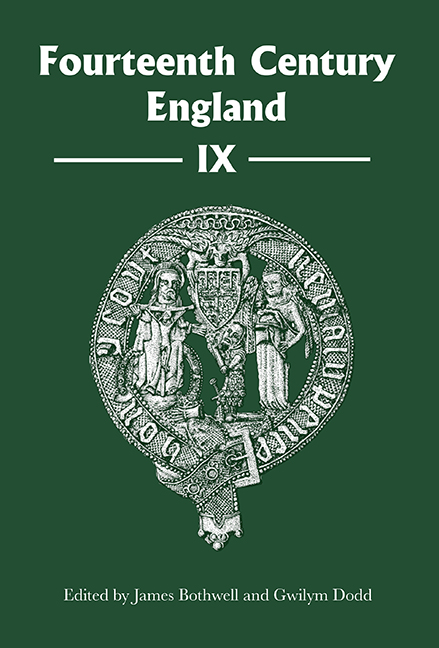Book contents
- Frontmatter
- Contents
- List of Illustrations
- Contributors
- Preface
- Abbreviations
- The Death of Edward II Revisited
- Living in the Shadows: John of Eltham, Earl of Cornwall (1316–36)
- Careers of the Lesser Parochial Clergy Before the Black Death
- Heritage and Symbolism: the Romans and Tanners in Fourteenth-Century York
- ‘Let Them Realize What God Can Do’: Chivalry in the St Albans Chronicle
- Historical Writing in the North-West Midlands and the Chester Annals of 1385–88
- High-Status Execution in Fourteenth-Century Ireland
- Traitor to the Chose Publique: Negotiating Constitutional Conflict Through the Law of Treason 1399–1402
- Notes and Documents – A Letter from Chatton: the Date and the Writer
- Fourteenth Century England Issn 1471–3020
‘Let Them Realize What God Can Do’: Chivalry in the St Albans Chronicle
Published online by Cambridge University Press: 07 May 2022
- Frontmatter
- Contents
- List of Illustrations
- Contributors
- Preface
- Abbreviations
- The Death of Edward II Revisited
- Living in the Shadows: John of Eltham, Earl of Cornwall (1316–36)
- Careers of the Lesser Parochial Clergy Before the Black Death
- Heritage and Symbolism: the Romans and Tanners in Fourteenth-Century York
- ‘Let Them Realize What God Can Do’: Chivalry in the St Albans Chronicle
- Historical Writing in the North-West Midlands and the Chester Annals of 1385–88
- High-Status Execution in Fourteenth-Century Ireland
- Traitor to the Chose Publique: Negotiating Constitutional Conflict Through the Law of Treason 1399–1402
- Notes and Documents – A Letter from Chatton: the Date and the Writer
- Fourteenth Century England Issn 1471–3020
Summary
In a remarkable passage, Thomas Walsingham speaks of a tournament in which twelve unnamed nobles, dressed in monastic habits, prove victorious in every encounter. Although the chronicler proves less than amused at their frivolity, he also notes, with perhaps a hint of pride, that the prowess these men displayed led the costumed warriors to make a firm vow: ‘that they would in the future show respect for the habit’. Their deeds in arms had transmuted a dangerous moment of knightly play into a new regard for the monastic profession.
Here, as in the rest of his chronicle, Walsingham confronted a chivalric culture that could assert its independence from clerical prescriptions. But instead of reacting to perceived impiety with fire and brimstone, Walsingham emphasised moments when faithful devotion inspired daring exploits. Such a focus on chivalric deeds reveals a great deal about this author's perception of his audience. Walsingham consistently associates physical suffering on the battlefield with the attainment of spiritual merit, as if this author thought that his readers would appreciate tales of heroic asceticism. His chronicle also consistently links political actors he despised to pacifism, as if the author expected his intended audience to associate honour with the display of prowess. This dual emphasis on suffering and militarism informs Walsingham's portrayal of orthodox Christianity, which he treats as a prerequisite to both military victory and social stability.
While the precise audience of Walsingham's history might not be known, it is significant that this chronicle focuses on chivalric values. Walsingham, writing in the middle of the Hundred Years War, had come to think of monastic and knightly concerns as if they were related. His work, in turn, provided readers with a model for how lay warriors might view a religious outlook as relevant to their profession and status.
Authorship and audience
Scholars have had little to say about the dynamic tension between Walsingham's engagement with chivalric culture and his defence of a monastic life. He has instead often been treated as either a reactionary figure, intent on suppressing dissenters’ attacks on the endowments of his house, or as a renaissance man, interested in furthering a new era of learning. Although his outlook on the Ricardian and Lancastrian eras has also received close analysis, it has primarily been its political implications that have proven worthy of examination.
- Type
- Chapter
- Information
- Fourteenth Century England IX , pp. 87 - 108Publisher: Boydell & BrewerPrint publication year: 2016



